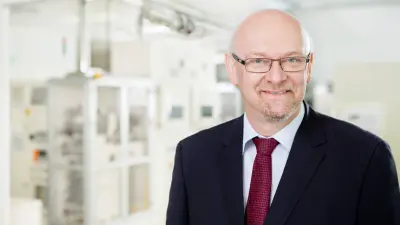Battery technology
Interview with Prof. Dr. Martin Winter

Prof. Dr. Martin Winter

Prof. Dr. Martin Winter has been researching electrochemical energy storage and energy conversion for nearly 25 years. The focus of his work lies with lithium-ion batteries and super capacitors. Winter holds a professorship at the WWU Münster, where he heads the MEET Battery Research Center.
Despite all the environmental targets, there are barely 20,000 electric vehicles on Germany’s roads.
Professor Winter, is this really because of the arguments that we keep hearing: the high purchase price and limited range of electric cars?
Winter: I don’t think the range plays a decisive role. If everyone could afford a city car, this would not be an issue. But for a second car, the technology is still too expensive. I see two other factors here as well: for one thing, the infrastructure is lacking. The network of charging stations isn’t as tight as that of conventional service stations. In addition to this, charging an electric vehicle is a relatively uncomfortable process. It takes about five minutes to fill the fuel tank of a conventional vehicle. Even at a fast charging station, it takes up to half an hour to charge an electric vehicle. And if you haven’t got a garage with a plug, you can’t charge your car at home, either. At the same time, the internal combustion engine is a mature product that uses cheap energy. So the challenge not only lies in the electric vehicle’s weaknesses, but also in the strengths of the established system. This makes it difficult for the electric car to compete.
In this environment, how realistic is the German federal government’s aim of increasing the number of electric vehicles to around one million by 2020?
Winter: The target was set in 2008–2009. It’s already 2015, and there are barely 20,000 electric cars on Germany’s roads. In light of the fact that there was not a single electric vehicle model on the market in 2008, it was a pretty ambitious goal. The question is, why should I buy one? The costs are high, the range is limited, and the infrastructure is inadequate. In other words, at the moment there aren’t enough attractive incentives to buy an electric car. While there are a few ideas like free parking or use of the bus lane for electric cars, the conventional internal combustion engine still has too great a competitive edge, one that is tangible for individual drivers. For this reason, I wouldn’t be surprised if we failed to meet the target by 2020.
Why is development work so slow?
Winter: It might seem like it’s taking a long time. Certainly, this is also because in Germany we’ve made relatively few resources available compared with other countries, and we’ve only recently begun to invest. It’s also true that we’ve never worked as intensively on e-mobility as we are now. But compared with other countries, such as Japan, the U.S., or Korea, we are still not doing much.
On a scale of 1 to 10: how close are we to developing a lithium-ion battery for vehicles that’s ready for mass production?
Winter: It’s hard to say — we’ve reached the point where we have lithium-ion batteries that meet minimum requirements in terms of reliability and service life. However, there is still room for improvement when it comes to range and performance at lower temperatures. On a scale of 1 to 10, I think we’re around 3 or 4. In contrast, I’d place the internal combustion engine around 7 or 8. Here, too, there’s still room for improvement: better exhaust gas treatment technology, lower fuel consumption.
When it comes to the electric vehicle, what are the alternatives to the lithium-ion battery?
Winter: If we’re talking about energy per unit volume, the lithium-ion battery is currently in the lead. But if we’re referring to energy per unit weight, which is the case in the aviation sector, lithium-sulfur technology is also interesting. At the moment, it does better than lithium-ion batteries here. In my opinion, the lithium-air battery cannot currently be used in either application. It needs a number of system components, and this makes it heavier. Even at cell level, the volumetric energy is not good. Even in the best of circumstances, the technology only has 85 to 90 percent energy efficiency. This represents losses of at least ten percent per cycle, which is too much. At the moment, this is basic research. We don’t yet know how things will turn out, but I don’t think we can expect a breakthrough overnight.
Are any solutions within reach?
Winter: When it comes to stationary batteries that aren’t mobile, I think cell chemistry will offer a number of possibilities in the next 10 to 15 years. The sky’s the limit, both in terms of volume and mass. This will give rise to new opportunities.
With regard to application in electric vehicles: how competitive is German battery research in an international comparison?
Winter: Japan, the United States, China, Korea: these countries are investing incredibly large amounts of money and time in battery research. In each of these countries, there are 50 to 60 colleagues working in the field. In Germany, there are ten at most. Many other researchers are temporarily contributing. In part, this is the result of the way research programs are structured: they are relatively short-term and are not seamlessly intertwined. So there is a lack of continuity. This leads to specialists dedicating their time to other topics. This is a pity, as it means that a great deal of knowledge is lost. It is thus a very good thing that the Federal Ministry for Education and Research launched the large-scale “Battery 2020” in 2014. The project aims to drive current initiatives forward and build networks between them.
What role do companies like Bosch play when it comes to driving development forward?
Winter: An extremely important role. These companies have a great deal of expertise, and they have the capital required to make use of this knowledge and drive new technologies forward. But they must be in it for the long haul.
In your view, how important are alliances between business, academia, and politics?
Winter: If we consider a topic like e-mobility to be a national challenge, and if we want to create a complete value-added chain from material to application, including cell and battery production, then cooperation is absolutely necessary. The conditions are good: in Germany, we have a number of networks that bring the different parts of the value-added chain together. The National E-Mobility Platform is one of them, as is the competence network for lithium-ion batteries. This is unusual, even in an international comparison, and the interplay works very well.
In closing, a personal question: When would you consider buying an electric vehicle?
Winter: I am waiting for the technology to move beyond its growing pains. I am also holding out until batteries are more affordable and have a higher range. And I’d like to see electric vehicles enjoy a special status: things like access to the bus lane and free parking. Then I wouldn’t hesitate!
(Interview with Prof. Dr. Martin Winter in December 2015)
